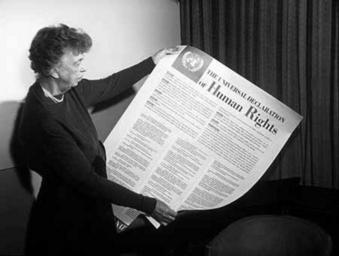6/27/2024
‘India and the Awakening East’ – this is the title of the book Eleanor Roosevelt wrote in 1953. In this book, Roosevelt was narrating her experience of visiting the Middle East, South and South East Asia in 1952. Most of the nations in the continent were independent by that time. The book reflects the perceptive mind of one of the famous figures of the 20th century. Though Eleanor Roosevelt was known as the wife of US President Franklin D. Roosevelt, she was more famous as a leader, spearheading movements for women empowerment and human rights. She played an important role for the Universal Declaration of Human Rights (UDHR).
I read this book a few years ago, but while rearranging the books in my library I came across it again today. Below I will post a few excerpts from the book and analyze them.
Regarding India, where she spent a good part of her trip, she was confident that under Prime Minister Jawaharlal Nehru’s leadership the newly independent nation would emerge a strong and prosperous nation, with a potential to provide leadership to Asia and the world. She wrote (pp. 223-234),
“Already most of the countries of Asia look to her (India) for leadership. Geographically, she lies between the Far East and Europe. On the strength of these facts alone, no country is in a better position to foster the growth of good will and understanding between East and West…We have a better chance in India than we had in China. In China much of the government was corrupt and the reforms that should have been made and that might have welded people together under Chiang’s leadership were not achieved. In India the government is honest and is straining every sinew to make the changes that will give the people a better life.”
One might wonder whether the US leadership of the 21st century is influenced by Roosevelt’s advice in cultivating India as a counterweight to China. The policies such as Indo-Pacific are recently popular in foreign policy jargons, particularly after China emerged as a global power and actively displayed its geopolitical ambitions, but one could see expression of such concerns in Roosevelt’s writing though China was not a global power during her time.
Roosevelt expressed concern about the rise of communism and its possible spread to newly independent countries including India. It was the time when World War II was over, but ideological rivalry between capitalism and communism was spreading across the world. She raised this issue multiple times in the book and expressed concern that it is possible that communist powers exploit poverty in India to garner support, but at the same time she expressed confidence in Nehru’s leadership, and hoped that under his leadership communism would not succeed in India. She wrote (p. 190),
“Prime Minister Nehru has always felt apparently that the Hindu religion, with its emphasis on nonviolence and truth, was inherently incompatible with communism, and that there was therefore no danger that communism would ever gain a real foothold in India.”
Roosevelt believed that besides the democratic set up of India, India’s very religious and cultural ethos would not allow communism to grow. The idea of nonviolence is against the idea of violence – and communism actively promoted violence (the famous words of Marx, ‘force is the midwife…’ comes to mind.) It seems the Gandhian ideal of nonviolence was accepted as one of the dominant ethos of India, but there were other ideal which were pursued passionately. Subhas Chandra Bose, one of Gandhi’s estranged colleagues, had visited Germany and then Japan during World War II to garner support for India’s independence and had even raised Indian National Army for this purpose.
Roosevelt’s reverence for Gandhi was palpable in the book. She visited one of the houses Gandhi established for unprivileged sections of Indian society in New Delhi. In her words (p. 196),
“I saw the room when we were in New Delhi, and I stood at the entrance awed by the thought of the power of the man (Gandhi) who had lived here. All there ever was in that room is still there – a rug, a rolled-up pad that was used at night as a bed, a pillow. People who came to see him sat cross-legged on the floor before him, as I should certainly have had to do had I ever had the good fortune to be received by him. I suppose if you have done it from birth, squatting on your heels is very comfortable and you can do it even in your old age. I myself find it practically impossible, and it irritates me that I have let my knees grow stiff.”
Her desire to see Gandhi was very much visible in these words, “had I ever had the good fortune to be received by him.” Whether one agreed or disagreed with Gandhi, there was no doubt that he was a charismatic leader, a kind of magnet pulling millions of people towards him through his simplicity and nonviolence principle. Roosevelt also imagined how she could have sat on the floor though she was not accustomed to squatting and her ‘knees grow stiff’.
Roosevelt was awarded honorary degrees from various universities of India. She mentioned some of those universities, including the university founded by Nobel Laureate, Rabindranath Tagore. The university, called Visva-Bharati, is located about 110 miles from Kolkata (then Calcutta). She expressed admiration for Tagore, his poetry and art works, and also mentioned how Gandhi and Tagore were friends. After receiving the honorary degree at Visva-Bharati, Roosevelt interacted with students. She noted that there were American students studying in that university. But somehow she found that too much emphasis on intellectual development or arts or spiritual development might not provide all-round education to do well in a pragmatic world. In her words (p. 192),
“I had a question and answer period with the students in the afternoon, and came away with the feeling that they were to some extent divorced from the real world. I do not mean that they were unaware of what was happening in the world, for they were not; but they seemed to stand apart from it, and lived almost in an ivory tower. I am sure the young Americans who are studying there are getting an excellent classical education; but if education in its broadest sense should prepare one to live in one’s own world, I wonder if they won’t find it difficult to adapt themselves when they emerge from the environment of this university where the stress is wholly on the intellectual, artistic and spiritual life?”
One could see the practical bent of mind of Roosevelt here. One could think of practical or vocational education, or the idea of building a workforce, etc. in this context.
This last excerpt (below) from the book is particularly appealing for me. Roosevelt here, as a well wisher of India, gave some wise counsel on how to build India as a prosperous country. She made a very germane argument that material development is necessary if a country wants to be successful. Here, she emerged as a critic of the Indian idea of renunciation, which, I think, makes sense. In her words (p. 198),
“There is no question in my mind that Prime Minister Nehru is trying to develop a democracy that, though perhaps not exactly like ours, will ensure all the people personal freedom. But if an accompanying prosperity is also to be achieved – and the government will not be successful unless it can demonstrate certain progress on the material side – considerable education and re-education of the people will be necessary. For a belief in the virtue of renunciation is not an incentive to hard work for material gain; but only hard work by all the people is going to bring any real betterment of their living conditions. Somehow a spiritual incentive, a substitute for renunciation, will have to be found. Somehow they must be made to realize the living and exciting possibilities of the freedom and democracy their new government offers them.”
While reading this passage I thought Roosevelt was speaking the language of the great Indians like Swami Vivekananda and Sri Aurobindo. Sri Aurobindo’s ideal of Integral Yoga emphasized on a life in which both material and spiritual developments were cultivated. And Swami Vivekananda popularized the ideal of practical Vedanta, an ideal that emphasized on practical – implying material – aspects of life while not undermining spiritual development. The ideal of renunciation/austerity remained a strain of Hindu life and leaders like Gandhi popularized them. But a study of ancient Indian scriptures reveals to us that Indian life never undermines material development. I do not know whether Roosevelt read Vedanta, but her words, ‘spiritual incentive’ appeared to me inspired by the ancient Indian scriptures.



